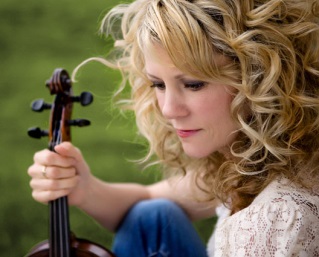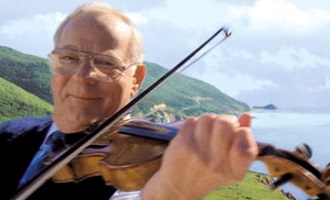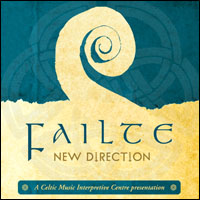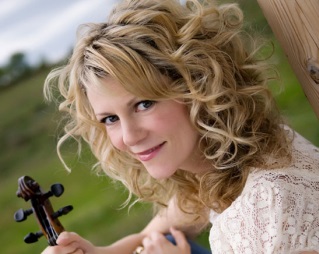Interview with Natalie MacMaster: Keeping the Culture Alive with a Fiddle
The legacy of immigration in the 1800's from Scotland to the Canadian province of Nova Scotia is evidenced in the strength of the cultural traditions that survive and which today are experiencing a renaissance. The musical traditions that flourish in the Cape Breton region of this Maritime province are most closely associated with the Fiddle. Cape Breton Fiddling, internationally renowned as a distinctive musical genre, is enjoying immense commercial success. Known for its fiercely individualistic musical style it is a dynamic musical genre that is changing with the generations of new fiddlers as they join the ranks.
Transceltic are honoured to have had the opportunity to interview Natalie MacMaster who, with two Grammy nominations, numerous music awards and multiple Gold Albums, is an internationally renowned fiddler in the forefront of the revival of Scots Gaelic musical traditions of Cape Breton. MacMaster is more than the take-away from her image of a polished, beautiful super star of popular Celtic culture. She is also Cape Breton musical royalty; the niece of the legendary Buddy MacMaster, married to Donnell Leahy of the award winning Leahy Family Band and himself a fiddler, and cousin to members of the MacIsaac family who boast several successful fiddlers. In a biographical sketch of her uncle Buddy written by Paul MacDonald it was noted that Natalie’s grandmother was accomplished at lilting, a form of traditional singing common to the Gaelic speaking areas of Ireland and Scotland, and would sing these magical songs for her family in her home. Thus, the musical talent, fame and success has come by her “honestly”.
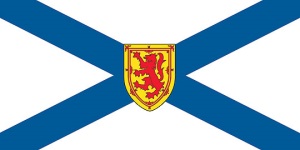
The Gaelic language, once spoken by an estimated 100,000 transplanted Scots and their descendents in Nova Scotia, is on a long road to revival. However it is the musical traditions of Cape Breton that moves from strength to strength. It is the music, and specifically Cape Breton Fiddling, that leads the way in the resurgence of Celtic culture in Nova Scotia; “Although pianos, bagpipes and the occasional guitar each contribute to Cape Breton’s signature sound, fiddles clearly dominate; and folks continue to play them in a way their kilted ancestors would recognise. It remains a purer form of their ancestral music than anything you might encounter in Scotland where fiddling Gaels, heavily influenced by the English, often felt compelled to reinvent themselves as classical violinists. As a result modern day Celtic performers and ethnomusicologists view cape Breton as a kind of cultural benchmark and regularly flock there to recover their lost heritage.” (MacCallum-Whitcomb, Celtic Music Interpretive Centre)
Another perspective on the tradition of fiddling in Nova Scotia comes from the landmark study published in 2002 by the Nova Scotia Museum; “Gaelic Nova Scotia – An Economic, Cultural and Social Impact Study” (Curatorial Report #97), written by Michael Kennedy:
Gaels have long been noted for their love of music and dancing, and they brought this affection with them to the new world. Gaels were immigrating to Nova Scotia during the golden age of Scottish fiddling and at a time when piping was still a robust folk art, so the initial musical environment that was established in the province was particularly rich and vibrant. Unlike Scotland, Nova Scotia was spared many of the pressures that would erode such forms of Gaelic cultural expression in the 19th century. Fiddlers began recording the Nova Scotia Gaelic musical tradition as early as the 1930s, and today there is a prodigious output of traditional music recordings by old and young exponents of the art. Fiddlers are the mainstay of local concerts and dances and are also active on tour throughout Canada and internationally. Some have been invited back to Scotland as instructors to help reintroduce the traditional Gaelic style of playing. In recent years, Cape Breton’s fiddling and step dancing traditions have achieved international recognition and have played a significant role in launching high profile events such as the East Coast Music Awards, which generate millions of dollars in revenue and garner enormous media coverage. Visiting fiddlers have noted that Cape Breton has one of the strongest fiddling traditions that they have encountered anywhere.
Natalie, and her uncle Buddy MacMaster, are Honorary Board Members at the Celtic Music Interpretive Centre located in Cape Breton. The mission of the Centre is to “Collect, Preserve and Promote" the traditions of the Celtic Music of Cape Breton Island through Education, Research and Performance”. Transceltic contacted Allan Dewar, Music Director at the Celtic Music Interpretive Centre. Dewar, a noted musician who has toured extensively and is a noted performer in his own right, directs music and education programs at the centre. We asked Dewar to give us his thoughts on the state of Cape Breton Fiddling and what the future may hold: “Cape Breton Fiddling is a living tradition and changes from generation to generation, so that the young musicians rising today reflect influences that were not the same as those from say 20 or 40 years ago. As the younger Fiddlers travel outside of Cape Breton, what could have been called at one time an “insular tradition”, is now exposed to many different influences and the fiddling of the younger generation reflects that. These influences have changed the music. Some of the young fiddlers coming up in the ranks today have never even heard some the music that influenced the previous generation so that it is truly a living tradition. We at the Centre conduct the “Buddy MacMaster School”, which is a week long program. The program, reflecting the individualistic nature of fiddling, has 10 different fiddlers conducting the classes over a one week period."
Dewar continued on the relationship between language and music: “Fiddling is a solo tradition, the Cape Breton style is centred on individual interpretation of the music. We at the Centre provide a vehicle and venue for individual styles to develop. In the old Gaelic speaking days this was through informal gatherings at the pub, at the Ceilidh (traditional social gathering where Gaelic music and dance was performed) or in the home. In today’s faster paced living there is little time for the old ways. We at the Centre provide that place where locals can come. When people play here at the Centre it is meant to be a comfortable environment, reminiscent of the old style gatherings where the individual styles of fiddling were nurtured. There is quite a resurgence going on with recent changes having led to a stronger commitment to the culture, language and the music of Gaelic culture. A growing recognition that the music is very closely tied to the language, that music comes from the language.”
Natalie, along with her band comprised of Mac Morin, Nathanial Smith, Shane Hendrickson, Eric Breton, Nate Douglas, Matt MacIsaac and her husband Donnell Leahy continue to tour extensively in North America. Natalie will be performing in Scotland at the Aberdeen Music Hall on October 5, 2013.
We leave you with this quote from the Boston Herald:
To call Natalie MacMaster the most dynamic performer in Celtic music today is high praise, but is doesn’t get at just how remarkable a concert performer this Cape Breton fiddler has become.
Interview with Natalie MacMaster
Transceltic are honoured to have had the opportunity to interview Natalie MacMaster:
1. Can you describe your ethnic identity; is it Scottish, Celtic or Cape Breton?
I think of myself as a Cape Bretoner and as a Canadian who has Scottish ancestry.
2. You are an acclaimed artist, boasting Grammy nominations, multiple awards and several gold albums. Do you consider yourself an Ambassador of Cape Breton or Celtic culture?
No, I don’t think of myself as that. I am told that some think of me in this way. I don’t try to be, it is just a spin-off from my music.
3. Your Uncle is the legendary Buddy MacMaster, the “father” of Cape Breton fiddling, known as one of the first Cape Breton fiddlers to be asked to teach in Scotland. What impact did your family’s musical traditions have on your career path?
On my career path the impact was huge. My Uncle Buddy has had a huge impact. He represents how I grew up, my Uncle Buddy, my family. Music was always there running through my genealogy. My family is very important to me.
My fiddling career just happened; it wasn’t anything I thought about. When I was a girl no one was making a living out of fiddling. Fiddlers just had jobs. I did go to Teachers College and got my teaching degree but I haven’t used it. I just played the fiddle and it took on a life of its own.
4. On the Gaelic language of Cape Breton; your father, and his brother, your Uncle Buddy, were born in to a Gaelic speaking family. Can you describe your relationship to the Gaelic language? What impact has the Gaelic language had on your music?
Unfortunately I did not grow up with the Gaelic language. My parents did not speak it and I did not hear the language at home. It is my understanding that as children my father and uncle were forced to speak English in the classroom. Although I did not hear the language at home I believe the language influences the music, there is Gaelic in the music.
5. It is said that Cape Breton Fiddling has developed, and diverged, from the fiddling traditions brought by the 19th immigrants to Nova Scotia from their native Scotland. Observers have made the point that Fiddling in Scotland has changed but that Cape Breton preserves the original musical traditions that are now lost in Scotland. Can you comment?
Yes, of course. I have heard this. My first thought is the influence that J. Scott Skinner had on my music. Skinner was a Scottish fiddler. Cape Breton music has evolved, especially in the past 20 years, and although it has strong Scottish roots, it has been here for a long time and has achieved a distinctive sound all its own.
6. What do you see as the future of the Music, Dance and Language of Gaelic culture in Cape Breton?
I know that there are efforts to preserve the language. It is not dead. It is not flourishing. There are enough people who are carrying on with language, many programs and workshops that try to continue the tradition.
Dance is in good shape, it was never a fancy or competitive tradition, I’d call it home grown; Just a good time, featured in the local venues, more of a casual tradition.
The Music of Cape Breton has a bright future, fiddlers are playing with a different, a better tone but with a different feel, a different tempo, an inner tempo. Things that can be felt and that are not easily articulated. It is something you can feel and many of us have noticed this change. I am excited and very hopeful for the future of Cape Breton music.
- Scottish
- English
- Log in to post comments



